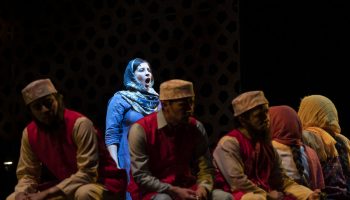At first glance, the two feature films Kimberly Reed has made appear to be vastly different.

One is about going back to her Montana home as a transgender woman, and the other is about campaign finance reform. But, as Reed points out, they both familiarize audiences with various groups of people and social and political issues.
Both of Reed’s films will be shown at the Chautauqua Cinema. “Prodigal Sons” will be shown at 12:30 p.m. Sunday and “Dark Money” at 12:15 p.m. and 5:15 p.m. Monday. The screening of “Prodigal Sons” coincides with the “As One Community Day” for Chautauqua Opera Company’s final production. Reed is a co-librettist on the opera, which is based her experiences as a transgender woman.
“Prodigal Sons” is an autobiographical documentary that recounts Reed’s journey back to her hometown to reconcile with her estranged, adopted brother, Marc. The film is about self-discovery — for Reed and her brother.
“Prodigal Sons” premiered at Telluride Film Festival in 2008, was released in theaters in 2010, and has won numerous awards.
“Perhaps the most devastating moment, and the film’s clearest instant of awareness of the difficulty of self-identification, comes when one character thanks another ‘for loving me for who and what I am,’ ” Michael Koresky wrote in a 2010 IndieWire review. “The fact that it is Marc who says this — in a documentary about and by his transgender sister — is rather remarkable.”
Producing a movie about oneself presents some challenges, Reed said. When presenting characters in film, the director has to find balance in the way the portrayal, which can be hard when the character is also yourself. Because she was so close to the story, Reed said editing the film was a “delicate” process.
“You lose a lot of perspective on it,” Reed said. “You’re constantly working in this bubble of not really seeing your own character in your film as most other people will see it.”
Making “Prodigal Sons” was the hardest thing she has ever done, Reed said.
“On top of everything else, when you’re making a film about your family and there’s all this family drama going on, you have to go through everything and process the emotions just as a person, much less a filmmaker,” Reed said.
Reed was motivated to make “Prodigal Sons” by the need to have more transgender people on screen. In GLAAD’s 2017 annual report of LGBTQ characters in film, only one film released by a major studio in 2016 featured a transgender character.
Since the release of “Prodigal Sons,” Reed said transgender individuals have become a more vital part of the conversation. Reed has noticed an increase in more transgender people behind the camera, which is crucial. Though representation has increased, she said there is still a long way to go.
“The thing that kind of kept me going, kept me from feeling too self-centered about that, was just the fact that I was not seeing any trans characters on screen, hardly any of them in books, and it’s just this really fundamental question about representation,” Reed said. “If you don’t see yourself represented, you tend to disappear and people don’t think you’re part of the equation — or you get misrepresented, which is very common. Usually misrepresented in really insulting ways. If any representation did happen, it certainly was, at the time, at the hands of cis people.”




